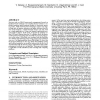Free Online Productivity Tools
i2Speak
i2Symbol
i2OCR
iTex2Img
iWeb2Print
iWeb2Shot
i2Type
iPdf2Split
iPdf2Merge
i2Bopomofo
i2Arabic
i2Style
i2Image
i2PDF
iLatex2Rtf
Sci2ools
DAC
2002
ACM
2002
ACM
Scheduler-based DRAM energy management
Previous work on DRAM power-mode management focused on hardware-based techniques and compiler-directed schemes to explicitly transition unused memory modules to low-power operating modes. While hardware-based techniques require extra logic to keep track of memory references and make decisions about future mode transitions, compiler-directed schemes can only work on a single application at a time and demand sophisticated program analysis support. In this work, we present an operating system (OS) based solution where the OS scheduler directs the power mode transitions by keeping track of module accesses for each process in the system. This global view combined with the flexibility of a software approach brings large energy savings at no extra hardware cost. Our implementation using a full-fledged OS shows that the proposed technique is also very robust when different system and workload parameters are modified, and provides the first set of experimental results for memory energy optimiz...
DAC 2002 | Design Automation | Low-power Operating Modes | Memory Energy Optimization | Unused Memory Modules |
| Added | 13 Nov 2009 |
| Updated | 13 Nov 2009 |
| Type | Conference |
| Year | 2002 |
| Where | DAC |
| Authors | Victor Delaluz, Anand Sivasubramaniam, Mahmut T. Kandemir, Narayanan Vijaykrishnan, Mary Jane Irwin |
Comments (0)

